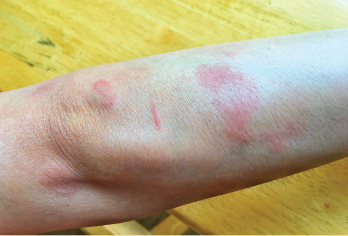
Shidlovski / shutterstock.com
CHICAGO—Antiphospholipid antibody syndrome (APS) mainly affects young women, but can also affect men. APS patients test positive for multiple antibodies, including lupus anticoagulant (LAC), anti-cardiolipin and/or anti-beta2-glycoprotein I. These antibodies are diagnostic of APS, and they place the patient at increased risk for thrombosis and, in women, pregnancy morbidity. Women with LAC or those who are “triple positive” (i.e., have LAC, medium- to high-titer anti-cardiolipin and anti-beta 2-glycoprotien I antibodies) have worse prognoses for pregnancy morbidity.
D. Ware Branch, MD, a maternal-fetal medicine specialist at the University of Utah, Salt Lake City, began the APS session at the 2018 ACR/ARHP Annual Meeting with a discussion of the implications of APS in the field of obstetrics. He noted recurrent early miscarriage (embryonic loss prior to 10 weeks of gestation) is probably the most common clinical criterion for the diagnosis of APS. Women with the diagnosis have been the focus of several treatment trials.
Treatment Trials
Dr. Branch reviewed the data from a half dozen trials representing approximately 500 patients. He and others have been skeptical of conclusions based on these trials because of the variety and number of antiphospholipid antibody tests used, the definition of positive results, the methods used to establish thresholds for positive results, the lack of confirmatory testing and the nature of the study designs. Many experts would argue some of the patients who were low positive for antiphospholipid antibodies should not have been considered to have APS. Moreover, live birth and miscarriage rates in the treatment arms varied considerably.
Analysis of these studies indicated pregnant patients should be given heparin plus low-dose aspirin to prevent pregnancy morbidity. However, “I don’t feel this is a settled matter,” said Dr. Branch. He said treatment with a heparin agent (typically a low molecular weight heparin) for recurrent early miscarriage in a woman with low-titer antiphospholipid antibodies is costly, potentially harmful and may be ineffective.
PROMISSE & IMPACT Studies
Dr. Branch introduced the Predictors of Pregnancy Outcome: Biomarkers in Antiphospholipid Antibody Syndrome and Systemic Lupus Erythematosus (PROMISSE) study, which was designed to identify predictors of adverse pregnancy outcomes in patients with APS or mild to moderate and stable systemic lupus erythematosus.1
Most patients with APS received the conventional treatment of a heparin agent plus low-dose aspirin during the observed pregnancy. Despite this, 19% of patients experienced adverse pregnancy outcomes, such as premature delivery, hypertensive disorders and thrombocytopenia, and 4% experienced fetal death, indicating women with APS are at risk for pregnancy failure, even with the standard conventional treatment. Dr. Branch noted these findings underscore how critical it is to closely monitor both mother and fetus.
The study also found LAC is the most powerful predictor of pregnancy outcome; 44% of pregnancies in women with APS and LAC resulted in adverse pregnancy outcomes despite treatment with heparin and low-dose aspirin.
In recognition that pregnant women with APS have a pronounced unmet medical need, Dr. Branch and colleagues have initiated the Improve Pregnancy in APS with Certolizumab Therapy (IMPACT) study. The investigators want to determine whether tumor necrosis factor-α blockade (certolizumab) during pregnancy, added to a regimen of heparin and low-dose aspirin, reduces the rate of adverse pregnancy outcomes in women with clinical APS and LAC, and alters angiogenic markers of poor placental vascularization. Dr. Branch encouraged the audience to inform their patients about the trial, which is actively recruiting patients from around the country.
